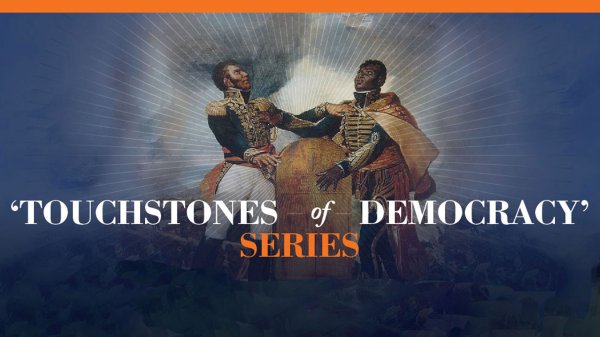Realizing the promise of democracy
We bring people together to explore and build solutions to the greatest challenges facing democracy.
250 Years of the American Experiment
Highlighting the Karsh Institute’s news, projects, scholarship, and events around the 250th anniversary of the signing of the U.S. Declaration of Independence.
Our People
Our Work
Events
Home
As the British occupied cities from Boston to Savannah during the American Revolution, how did the household become a crucial zone of meaning and transformation? Lauren Duval (Karsh Institute fellow) will discuss her new book with Jane Kamensky (Monticello).
Indigenous Democratic Traditions: Arts Workshop
Learn the traditional craft ways of gourd painting, through this hands-on workshop with Deborah Wilkinson.
Indigenous Democratic Traditions: Before America’s 250th & Beyond
Explore the foundations and futures of tribal governance and how they have contributed—and continue to contribute—to the broader democratic landscape of the United States.
Looking for past events?
View ArchiveIn the News
Public Opinion Is the Strongest Political Force, Pelosi Tells UVA Audience
"Our Founding Fathers—and here we are at Mr. Jefferson’s University—believed that democracy could work because of the goodness of the American people,”Pelosi said at the Karsh Institute's "Congress as a Cornerstone of American Democracy" event at the Rotunda.
news.virginia.edu
Rep. Nancy Pelosi Visits UVA, Warns of Power Shift in Washington
Pelosi urged attendees at a Karsh Institute event in the Rotunda to maintain faith in democracy and our country’s Constitution during what she sees as a tumultuous period.
www.29news.com
Pelosi Speaks on Redistricting, Democracy During Area Stop
At a Rotunda event hosted by the Karsh Institute, Pelosi addressed students and community members, emphasizing the importance of the Constitution’s separation of powers and warning that the system of checks and balances is being tested.
www.cbs19news.com
Rep. Nancy Pelosi on American Politics: ‘It’s a Different World Right Now’
During an event hosted by the Karsh Institute, Pelosi said she continues to believe in “the goodness of the American people,” and that she believes Republicans in Congress will reassert the separation of powers as laid out in the Constitution.
cvillerightnow.com







